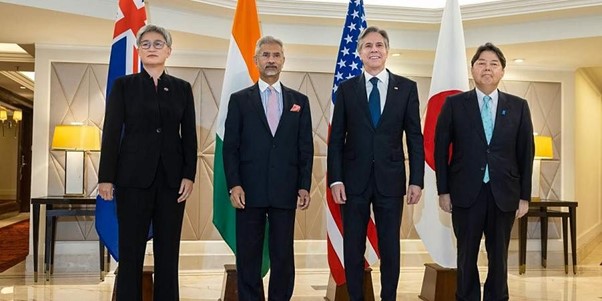
The Quad Foreign Ministers Meeting- Key Takeaways

With Japan and India being Chair of G-7 and G-20 respectively during this year, the Quad Foreign Ministers meeting in Delhi had aimed to signal broader geopolitical coherence among the Quad members. In the last five years, the Quad members have held regular meetings to discuss regional and global security issues based on their shared fundamental values, such as democracy, human rights, and rule of law. While the tentative beginning of Quadrilateral Security Dialogue in its first iteration or Quad 1.0 in 2007 was the ephemeral, cautious beginning of its second avatar in 2017 i.e. Quad 2.0 made rapid progress in its institutionalization even during the Covid crisis through evolving consensus and expanding cooperation.
The Quad foreign ministers meeting was scheduled between G-20 Foreign Ministers’ meeting in Delhi on March 02, 2023, and the Quad ministerial panel discussion at India’s annual premier conference on geopolitics and geo-economics, the Raisina Dialogue on March 03, 2023. However, the presence of Japan’s Foreign Minister Yoshimasa Hayashi in these events remained uncertain due to compelling political commitment to participation in parliamentary discussions on the budget in Tokyo. During the G-20 meeting, Japan was represented by State Minister for Foreign Affairs Kenji Yamada. This uncertainty created a lot of hand-wringing in Tokyo, with commentators urging the Diet-Japan’s Parliament- to respond flexibly since Hayashi’s absence from the meetings scheduled in Delhi could lead to a “decline in Japan’s diplomatic power”.
Finally, Mr Hayashi made it in time for the Quad Foreign Minister Meetings and also participated in the Quad ministerial panel discussion during the Raisina dialogue. The short-lived uncertainty over the Quad ministerial and the kerfuffle which it created in Japan is emblematic of the growing importance of the Quad framework. It may be recalled that Japan’s Prime Minister Suga had participated in the Washington Summit even though he had indicated his desire to step down from the premiership of Japan. Similarly, Australian Prime Minister Albanese flew to Tokyo immediately after being sworn in as the Prime Minister.
The strategic alignment among the Quad members further strengthened in 2022 amid the Russian invasion of Ukraine. February 2022 saw a Quad foreign ministerial meeting held in Canberra, and a virtual summit of Quad leaders took place in the following month. The Quad leaders confirmed their concerns over the Ukraine crisis during the meeting. In May 2022, the in-person Quad leaders’ summit took place in Tokyo which further cemented the partnership through renewed commitment towards bringing tangible benefits to the region.
Quad as a Force for Good
During the Quad Summit in Washington in September 2021, Prime Minister Narendra Modi expressed his firm belief that the grouping of four democracies would act as a “force for global good” and ensure peace and prosperity in the Indo-Pacific as well as the entire world. During Tokyo Summit in May 2022, PM Modi in his opening remarks said that the Quad has gained a significant place on the world stage in a short period, and it is moving ahead with a constructive agenda for the Indo-Pacific region which will further strengthen its image of a “force for good”.
The joint statement after Tokyo Summit outlined concrete measures to showcase the group as “a force for good” which is “committed to bringing tangible benefits to the region” at a time of profound geopolitical challenges. In a rather oblique reference to Chinese coercion, the leaders said they “strongly oppose any coercive, provocative or unilateral actions that seek to change the status quo” in the Indo-Pacific. These include “the militarization of disputed features, the dangerous use of coast guard vessels and maritime militia, and efforts to disrupt other countries’ offshore resource exploitation activities”. The Quad announced a new maritime surveillance initiative – the Indo-Pacific Partnership for Maritime Domain Awareness (IPMDA) – to address these concerns. The initiative aims to work with regional partners to respond to humanitarian and natural disasters and combat illegal fishing.
The leaders also committed to deepening cooperation on infrastructure, saying such investment is “critical to driving productivity and prosperity in the Indo-Pacific region”. This includes addressing debt issues and extending more than $50bn in infrastructure assistance and investment in the Indo-Pacific over the next five years. They specifically pledged additional help for island nations in the Pacific, where China’s influence has grown in recent years.
The Quad leaders also addressed the war in Ukraine, reaffirming their resolve to “uphold the international rules-based order where countries are free from all forms of military, economic and political coercion”. And while their statement did not mention Russia by name, it said the leaders had discussed the “tragic” conflict in Ukraine and underscored the “respect for sovereignty and territorial integrity of all states”.
The Quad had already established six leader-level working groups on COVID-19 Response and Global Health Security, Climate, Critical and Emerging Technologies, Cyber, Space, and Infrastructure at the Washington Summit in 2021. Tokyo Summit further institutionalized the working group agenda and focused areas of cooperation.
Cooperation on technologies emerged as a key priority area for the Quad members during the Tokyo Summit given the growing technology competition between China and the others in the region. The Quad’s capacity in the area of global semiconductor supply chains was being mapped to leverage the complementary strengths of the four countries that can help ensure “a diverse and competitive market for semiconductors.” In addition, the four countries issued a Common Statement of Principles on Critical Technology Supply Chains aimed at accelerating the pace of cooperation on semiconductors and other critical technologies.
Deciphering the Joint Statement
The Quad foreign minister meeting in New Delhi took stock of made on the agenda set by the leaders in the Tokyo Summit and also prepared the agenda for the next summit in Australia later this year. During the ministerial panel in Raisina Dialogue, Quad Foreign Minister highlighted some of the key issues under discussion.
According to India’s External Affairs Minister Jaishankar, the Quad could make a difference by addressing three key issues. First, a more reliable and resilient supply chain, the second digital challenge of trust and transparency and third connectivity. Ministers agreed on a counter-terrorism working group and SoPs for the Humanitarian Assistance and Disaster Relief (HADR) initiative. All four countries agreed to strengthen the UN and international system through a comprehensive reform agenda, including through the expansion of permanent and non-permanent seats of the UN Security Council.
While reiterating that the Quad was not a military grouping of any sort and was not aimed at countering China, the members reaffirmed the grouping’s commitment to a free and open Indo-Pacific and said it strongly supports the rule of law, sovereignty, territorial integrity and peaceful settlement of disputes. Without directly naming China, These oblique references highlighted China’s growing assertiveness and irredentist behaviour in the region. Japanese Foreign Minister Yoshimasa Hayashi argued that “We don’t try to exclude anybody (including China). As long as China abides by international norms and laws As long as China abides by international norms and laws then there are no conflicting issues between China and the Quad.”
Explaining the idea behind the Quad, US secretary of State Blinken said, “Quad is made to focus on certain things where the particular attributes of our countries when brought together make sense.” He also noted that “There are other places where different groupings of the countries make more sense because they address the particular interests or attributes that those countries can bring to the table.” Drawing on an analogy between the Asian Quad with the iconic English rock band ‘The Beatles and Quad, Minister Hayashi said, “This is not a band like the Beatles where everyone jointly releases an album every few years as a rock band… The members are fixed and they always play together for 10 years. This is more like a soft group within the Beatles, and like Paul McCartney may release a solo of their own.” This comment in a lighter vein aptly highlights resilience in the Quad architecture and also points to the fact that Quad members are not expected to have a common position on all geopolitical issues. India’s nuanced position on the Ukraine war and related issues on sanctions imposed on Russia is an illustrative example. Japan and India not being part of AUKUS are another.
Foreign Ministers of Quad countries reiterated their commitment that the Quad, acting as a force for regional and global good, will be guided by the priorities of the Indo-Pacific region through its positive and constructive agenda. The Quad members, through practical cooperation, aimed to ameliorate contemporary challenges such as health security, climate change and the clean energy transition, critical and emerging technologies, infrastructure and connectivity, addressing the debt crisis through sustainable, transparent and fair lending and financing practices, space cooperation, cyber-security, humanitarian assistance and disaster relief, maritime security and counterterrorism.
The Quad Foreign Ministers also reaffirmed the Quad’s steadfast commitment to supporting a free and open Indo-Pacific, which is inclusive and resilient. The quad members also reaffirmed consistent and unwavering support for ASEAN centrality and unity, and the ASEAN-led architecture- including the East Asia Summit and ASEAN Regional Forum. They also welcomed Indonesia’s 2023 ASEAN Chairmanship and vowed to support its Chair theme “ASEAN Matters: Epicenter of Growth.” They also reiterated their commitment to supporting Pacific Island countries in line with the objectives of the Pacific Islands Forum’s 2050 Strategy for the Blue Pacific Continent
The meeting also discussed the Ukraine conflict and underscored the need for a comprehensive, just, and lasting peace in Ukraine under international law, including the UN Charter. While India has thus far refrained from criticizing Russia’s action in Ukraine, it joined other Quad nations in concurring that the use or threat of use of nuclear weapons is “inadmissible”. Without directly naming Russia, the Joint Statement emphasized that the rules-based international order must respect the sovereignty, territorial integrity, transparency, and peaceful resolution of disputes.
The Quad Foreign Ministers also “unequivocally” condemned terrorism and violent extremism in all its forms and denounced the use of terrorist proxies and financial or military support to terrorist organisations which could be used to launch or plan terrorist attacks, including transnational and cross-border strikes.
The establishment of a Quad working group on counter-terrorism was announced to explore measures to counter new and emerging forms of terrorism, radicalisation and violent extremism. The Quad Foreign Ministers also “unequivocally” condemned terrorism and violent extremism in all its forms and denounced the use of terrorist proxies and financial or military support to terrorist organisations which could be used to launch or plan terrorist attacks, including transnational and cross-border strikes. They reiterated their condemnation of terrorist attacks, including the 26/11 Mumbai strikes, which claimed the lives of citizens from all Quad countries, and the Pathankot attacks.
Coping in the Time of Rising Geopolitical Tension
Unarguably, the Quad has grown in profile and widened its scope to emerge as a premier regional grouping. The Quad has emerged as a key pillar of stability in the Indo-Pacific through its positive, practical and constructive agenda. Acting as a force for regional and global good, the group has prioritized a range of critical non-security or security-adjacent functions, such as technology, infrastructure cooperation, public health and climate change over security-related cooperation. This emphasis has aimed to ameliorate regional apprehension of heightened geopolitical tension.
Notwithstanding repeated insistence of the four foreign ministers that the Quad is not a military grouping aimed against any country, the Chinese foreign ministry spokesperson referred to the Quad as an exclusionary block. Chinese President Xi Jinping issued an unusually blunt statement criticizing the United States during his speech to delegates at an annual congress in Beijing. “Western countries—led by the U.S.—have implemented all-round containment, encirclement and suppression against us, bringing unprecedentedly severe challenges to our country’s development,” Mr Xi was quoted by state media. China’s new Foreign Minister Qin Gang in his first press conference argued that the Indo-Pacific construct is an attempt to encircle China which is bound to fail. He also warned Washington against crossing the “red line” in Taiwan, and without directly naming the US, said “an invisible” hand was escalating the war in Ukraine for geopolitical gains. Increasingly sharp rhetoric from China could be a harbinger of intensifying geopolitical tension and growing strategic instability.
Given the recalcitrant and assertive approach of China, this approach may need a review. During this period of strategic uncertainty and heightened military tension, the Quad need to prepare for coping strategic responses to fast-moving crises such as regional military tensions, potential conflicts and even natural disasters. While it is a fact that the Quad is not a military alliance, it needs to be kept in mind that it is a strategic dialogue which aims to deter challenges to rule-based order and potential military misadventures in the Indo-Pacific region through collective efforts for power aggregation. During this period of great strategic uncertainty, the Quad needs to step up its agenda to discuss coping strategies and enhance collective preparedness through military cooperation.
Disclaimer
The opinions expressed in this article are the author’s own and do not reflect the views of Chanakya Forum. All information provided in this article including timeliness, completeness, accuracy, suitability or validity of information referenced therein, is the sole responsibility of the author. www.chanakyaforum.com does not assume any responsibility for the same.
Chanakya Forum is now on . Click here to join our channel (@ChanakyaForum) and stay updated with the latest headlines and articles.
Important
We work round the clock to bring you the finest articles and updates from around the world. There is a team that works tirelessly to ensure that you have a seamless reading experience. But all this costs money. Please support us so that we keep doing what we do best. Happy Reading
Support Us



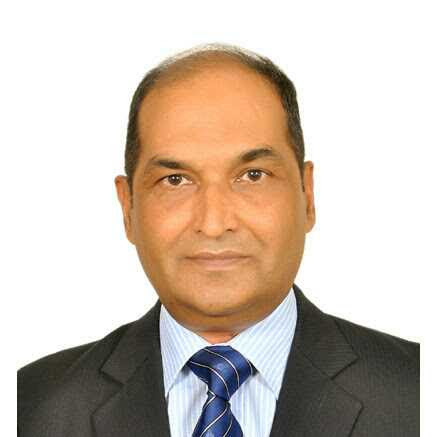




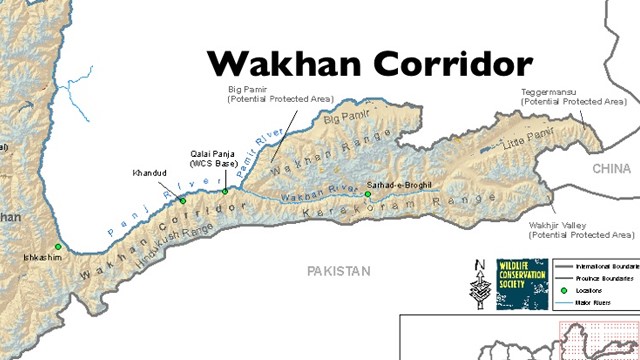


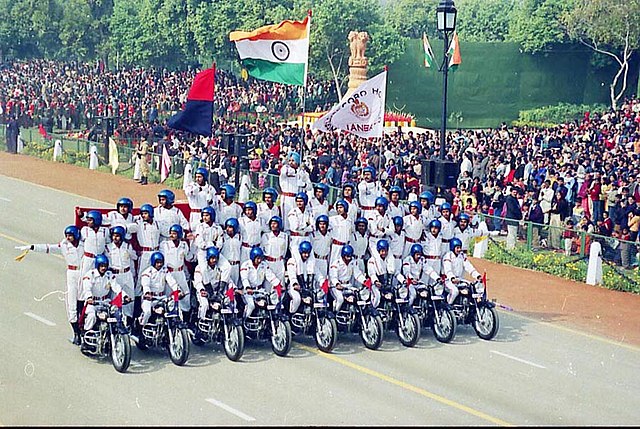

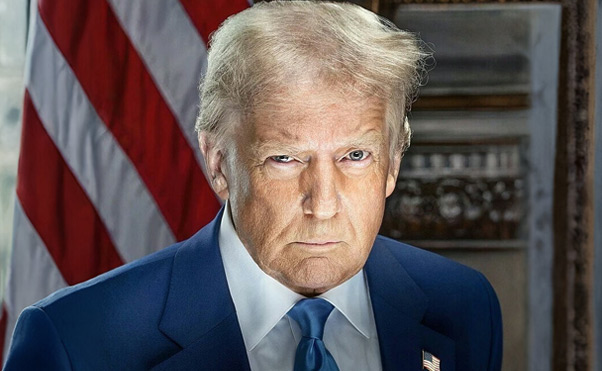

POST COMMENTS (0)